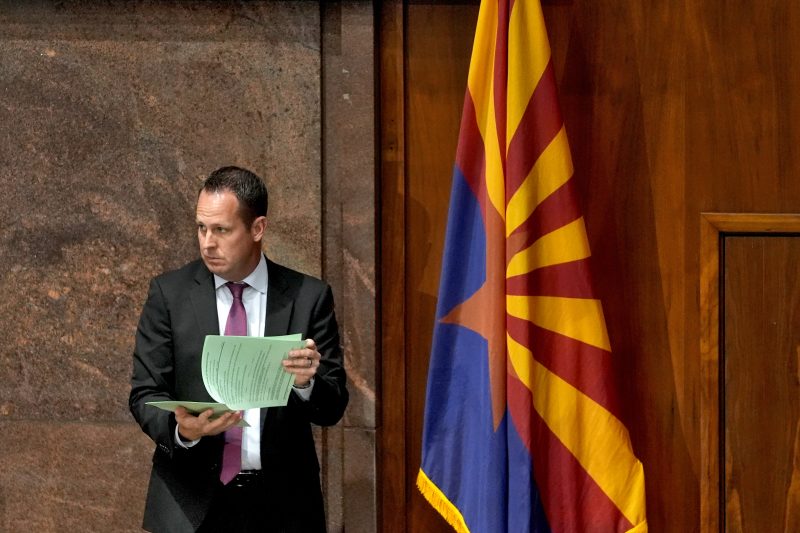Lazarus Group Targets LinkedIn Users, Impersonates Fenbushi Capital Executive: SlowMist
Arizona and Florida will fix abortion bans, Trump predicts. Not so fast.


Donald Trump and his allies have made it abundantly clear they would rather wash their hands of the harsh abortion bans in Florida and especially Arizona that threaten the GOP politically.
“So Florida’s probably going to change, Arizona’s going to definitely change,” Trump said Wednesday, while continuing to punt on saying what specifically should be done about the bans. “Everybody wants that to happen.”
“This will be fixed in the next week or two; let not your heart be troubled,” Fox News host Sean Hannity added Wednesday night of the Arizona ban. “I can — I can pretty much assure that that will happen.”
But the reality and the internal GOP politics aren’t nearly so simple. That was quickly made clear in Arizona.
State lawmakers immediately sought votes in the legislature to repeal the severe 1864 abortion law revived Tuesday by the state Supreme Court. That law bans nearly all abortions — including in cases of rape and incest — and threatens providers with two to five years in prison.
But Republicans blocked them. In the state Senate, the GOP blocked a motion on a rule change that would allow Democrats to introduce a repeal bill. In the state House, a Republican who has criticized the 1864 law pushed for a vote on an existing Democratic proposal to repeal it. But he was thwarted when leaders called for a recess and then adjourned for a week.
There’s perhaps something to be said for having an actual debate about how to handle the situation, and there is time given the state Supreme Court put the law on hold for 14 days.
But it’s also clear that nixing or even changing the law in a state legislature controlled by Republicans isn’t as easy as advertised.
State House Speaker Ben Toma (R), for instance, has told Axios he doesn’t support repeal and won’t allow a vote on it. Both he and state Senate President Warren Petersen filed a brief in the case before the Arizona Supreme Court advocating for the 1864 law.
Toma is also running in a competitive July congressional primary against some big names who have taken hard line antiabortion positions, including former congressman Trent Franks and 2022 Senate candidate Blake Masters. (Franks once picketed abortion clinics; Masters has in the past said he would support a national version of Arizona’s 1864 law, and he responded to this week’s news by saying, “I’m proud to be pro-life, and I make no apology for it.”)
The Toma situation is a microcosm of the GOP’s broader dilemma. It’s one thing to say the 1864 law goes too far; it’s another to figure out what to do about it. Do you completely take it off the books and let Arizona’s 2022 15-week ban take over? How many weeks do you set the ban at? Do you just add rape and incest exceptions and/or get rid of the prison threat for providers?
The result could effectively be Republicans greenlighting the legalization of at least some abortions. That’s the kind of thing that could prove difficult to sell to your fellow partisans, many of whom truly believe abortion is murder and should be treated as such. The results of a Wall Street Journal poll conducted last month showed just one-third of Arizona Republicans said abortion should generally be legal.
The Republican Party in recent years has been riven by the interests of individual Republicans appealing to the far right and the interests of the broader party. Arizona in particular has featured one of the most extreme state GOPs for decades. All of that looms large here.
The situation in Florida won’t feature a tidy resolution, either.
There, the six-week abortion ban that the state Supreme Court greenlighted last week was passed by the state GOP and signed by Gov. Ron DeSantis (R) last year. The court also greenlighted a November ballot measure that would enshrine abortion rights in the state’s constitution, effectively giving voters the power to veto the six-week ban.
Given the GOP just enacted the ban, it would seem unlikely the state legislature would quickly reverse course. It’s also far from certain that voters will do it for them.
While abortion rights measures have passed without fail since Roe v. Wade was overturned, even in red states, Florida features a higher threshold for passage than most others: 60 percent. That’s a threshold that such measures have failed to reach in similarly situated states like Michigan (56.7 percent) and Ohio (56.8 percent).
An Emerson College poll released Thursday reinforces the difficulty the measure faces. It shows support for the amendment outpacing opposition by 17 points, 42 percent to 25 percent, but with one-third undecided, leaving the measure far from 60 percent at this early juncture.
The poll also shows slightly less than 6 in 10 voters view the six-week ban as “too strict” — 57 percent — also suggesting getting to 60 percent could prove difficult. (The remainder said the ban is either “about right” or “not strict enough.”)
What we could have is a situation in which a strong majority of the state votes against the GOP’s ban, but it’s not enough to actually get rid of the ban. It’s also possible that some conservative voters who think the six-week ban is too strict might not want to go so far as to fully enshrine abortion rights in the state constitution, leaving what even they view as a suboptimal policy in place.
Trump in a video Wednesday night put on his political strategist hat and wagered that his focus on states’ rights — while avoiding specifics — had neutralized an abortion issue that currently dogs his party.
“The only issue [Democrats] think they have is on abortion,” Trump said in a social-media video. “And now all I say is that states are handling it. And it’s totally killed that issue.”
Not so fast.











